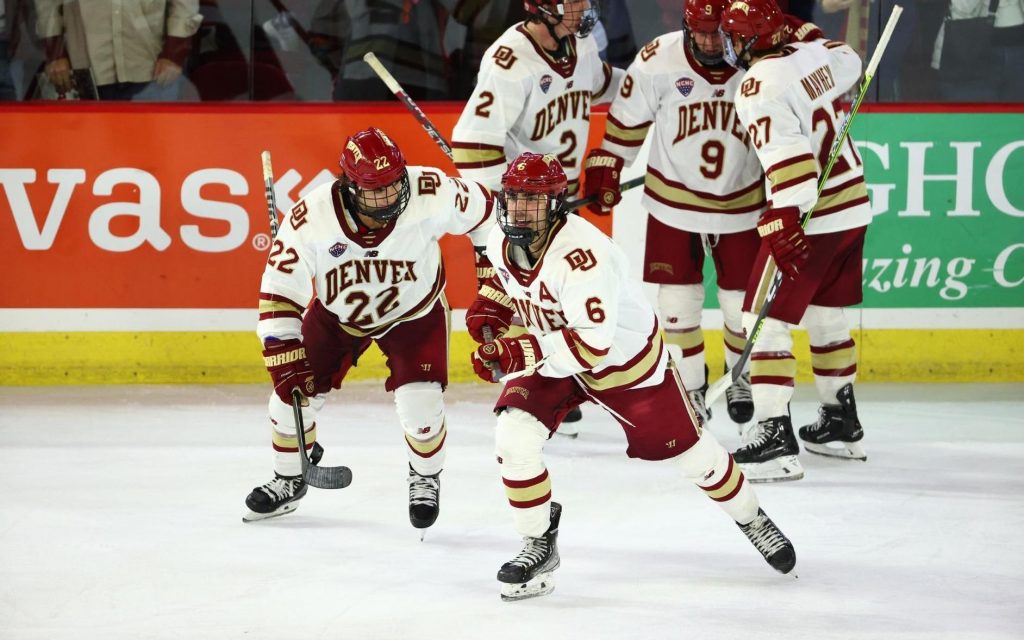
Just over 80 miles west of Agganis Arena, Denver University cashed in its ticket to the Frozen Four for the second time in three years, and the first time since becoming national champions in 2022.
The Pioneers defeated the University of Massachusetts and Cornell in the war of attrition that was the Springfield Regional. The region’s top-seeded team eked out back-to-back 2-1 victories in a rare defensive showcase for the typical high-octane Denver offense.
The Pioneers (30-9-3) earned a date with the No. 2 overall seed Boston University Terriers (28-9-2) at the Frozen Four in Saint Paul on Thursday. The two teams were top seeds in their respective regionals, and, yet, both were forced to travel halfway around the country to earn their semifinal bid.
While the two teams were in the same Manchester, New Hampshire regional last season, they never met due to the Big Red’s upset in the opening round. The last time BU and Denver battled was in October 2017 when the then-No. 1 Pioneers earned the 4-3 win.
The Terriers and the Pioneers will dance at 5:00 p.m. EST at the Xcel Energy Center for a chance to take on either Michigan or Boston College in the National Championship on Saturday.
Pios offense slow in Regionals, but can overpower
Denver and “offense” have become synonymous this season with the top production in the country, scoring at over 4.7 goals per game on average. The Pioneers have scored six or more goals in a game 13 times this season.
Denver is headlined by junior forward Jack Devine, a Hobey Baker top-10 finalist. Devine owns a team-leading 56 points with 27 goals and 29 assists. He is accompanied on the top line by freshman Sam Harris, who was slow to develop but hit a streak of eight goals in seven games from mid-February to early-March. Harris had been kept off the board since March 9 until he scored the eventual game-winner against Cornell.
Junior forward Tristan Broz is slotted in as the top line center for the injured Massimo Rizzo. Broz’s 39 points are fourth on the team, but he earned the spotlight after scoring the double-overtime game-winner against UMass.
The Pioneers’ top line is made up of the team’s top three goal-scorers, taking a 31% share of the team’s goals. This is nearly identical to the Terriers’ freshman top line, which owns 32% of all goals.
The Pios’ top center Rizzo led the NCAA in scoring prior to his lower-body injury in mid-February. His average of 1.57 points per game put him in early Hobey Baker conversations, but he has since missed 14 games. He has been skating with the team, making his availability to return in the Frozen Four up in the air — a potentially major addition for an already dangerous offense.
Two other freshmen have also risen to prominence for the Pioneers. Miko Mattika has been streaky throughout the season with 14 goals in 14 games from November to mid-January, but scoring scarcely since. However, the “one-shot scorer,” as Denver head coach David Carle said, has scored four goals in the last four games, including a big one against the Big Red.
The other freshman is blueliner Zheev Buium, who has the second-most points for a defenseman in the NCAA behind BU’s Lane Hutson. Buium’s 49 points include the third-most assists in college hockey with 38 and a point recorded in 30 of 40 games played.
Cornell’s defense is tops in the nation, and the Terriers aren’t too far behind. However, it will be hard to muffle the Denver offense for a third-straight game. Both UMass and Cornell relied on physicality to make the Pios uncomfortable, but Denver’s talent and screen game bought them time and gave them enough of an edge.
Denver defense, penalty kill noticeable Achilles heel
The Denver offense may be a juggernaut, but the defense has been a liability at times throughout the season, allowing 2.83 goals per game on average and forcing the team to win shootouts. Prior to the playoffs, Denver was 2-7-1 when the team scored less than four goals in a game.
However, when the offense stifled in the Regional round, two goals was all the team needed in each game.
Denver senior forward Mckade Webster said improving defensively was the “focal point” for the Pioneers halfway through the season.
“That’s something that we really needed to work on, and I think now everyone has just bought in, everyone is sacrificing everything they have and doing whatever it takes for team success right now,” Webster said to the Denver Post.
The defensive success may continue, but it will be near-impossible to hold the Terriers to just one goal — a feat opponents have only accomplished three times all season. The UMass offense doesn’t rank in the top half of the NCAA in offensive production, and Cornell sits outside the top 10. The Terriers rank fourth in scoring with over four goals scored per game on average.
One glaring mismatch the Terriers can exploit is special teams. Denver’s penalty kill ranks in the bottom quarter of the NCAA with a .776 kill percentage. On the other side, BU has the third-best power play in the league, converting at a .281 rate and scoring nine man-advantage goals in the last seven games.
The Pioneers are getting hot at the right time with only two power-play goals allowed in the last 85 penalty minutes, so the question is: Can the penalty kill continue to stand tall or will it come back down to Earth when it matters most?
Goaltender play could be sole determinant
Junior netminder Matt Davis isn’t the highlight of a talented Denver squad. Statistically, Davis isn’t even a top-25 goaltender in the nation. However, the Pioneers simply wouldn’t be in the Frozen Four without him.
Davis waited two years for his time between the pipes, backing up Magnus Chrona. Davis played five games this season before a lower-body injury sidelined him for 12 games. He then returned after New Years. The goaltender has been hot and cold throughout the season, but with the pressure all the way up, he’s reached a new height.
Davis holds a .911 save percentage and a 2.48 goals-against average this season. His save percentage fell to .878 during the NCHC playoffs, however, Denver still hung the banner.
So far, he has absolutely delivered in the NCAA tournament with a career-high 46 saves in a gauntlet double-overtime bout against UMass. The Pioneers ended up on top 2-1 after 92 minutes and 28 seconds of hockey.
Two days later, Davis recorded a 24-save performance, only allowing one goal in a 2-1 victory over Cornell when the Pioneers’ offense stalled again. Most impressively, the junior made nine saves in the final period, allowing no goals and recording a highlight reel sliding save on Cornell’s Ryan Walsh backdoor one-timer with 10 seconds remaining to send Denver to St. Paul.
Matt Davis with one final save. DU headed back to the Frozen Four. Bonkers sequence.#GoPios pic.twitter.com/JXgciezL5p
— Ryan Sikes (@ryan_sikes10) March 30, 2024
While Davis has looked exceptional with a .972 save percentage in the Regional, he hasn’t faced off against an offense as potent as BU in the tournament yet. When faced against teams in the top 10 this season, Davis recorded a .883 save percentage, 3.4 goals allowed on average and a 2-3 record.
BU is in a similar position when it comes to goaltender play. Junior Mathieu Caron may not be the most talked-about Terrier, but his play has been instrumental to the team’s success down the stretch. While the focus may be on the names that fill headlines like Macklin Celebrini or Jack Devine, the winner may ultimately be determined by the quiet keystones of both teams.




Recent Comments